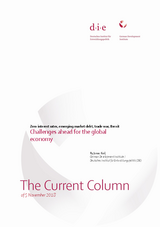The Current Column
Zero interest rates, emerging market debt, trade war, Brexit
Challenges ahead for the global economy
Keil, JonasThe Current Column (2018)
Bonn: German Development Institute / Deutsches Institut für Entwicklungspolitik (DIE), (The Current Column of 5 November 2018)
Bonn, 5 November 2018. Industrialised countries are experiencing an economic boom, as a number of fundamental indicators show. Unemployment in Germany is presently at its lowest rate for decades and the United States is expected to record strong economic growth, not least as a result of tax cuts by the Trump administration. Nonetheless, storm clouds are slowly gathering for the global economy. As illustrated by current stock-market turbulence, a number of problems are smouldering in the former growth markets of the emerging economies, and even industrialised nations. Economic policy-makers and central banks need to respond level-headedly to these challenges to avoid the outbreak of a global economic recession. Ten years on from the eruption of the global financial crisis, and in Europe especially, monetary policy has still not fully emerged out of crisis mode and yet it already faces new challenges. In response to the profound global financial crisis that started in 2008 and the Eurozone crisis that subsequently broke out in 2009, central banks such as the European Central Bank (ECB) and the US Federal Reserve System (Fed) were forced to cut their key interest rates to zero percent. They also bought government bonds on an unprecedented scale in order to flood the markets with monetary liquidity and stimulate the economy again. Over the last three years, the Fed has begun to progressively normalise its monetary policy by gradually raising its key interest rate. By contrast, the ECB is continuing to maintain a zero per cent rate for the foreseeable future, though it is slowly cutting bond purchases. Problems in emerging economies... The loose monetary policy of the last decade has also driven public and private debt, especially in emerging economies. The debt burden of private companies in countries such as Argentina and Turkey has significantly increased since the last financial crisis. Foreign debt is a particular problem in this context. If the rising interest rates lead to an appreciation of the Dollar and Euro, then the burden of emerging economies’ debt incurred in these currencies will increase, perhaps to unsustainable levels. This is a risk that has also been highlighted by the International Monetary Fund (IMF). A report released at the Annual Meetings of the International Monetary Fund and the World Bank Group in October warns that a growing debt burden could be accompanied by currency depreciations and significant capital outflows. Many emerging economies are highly unlikely to be able to manage such a crisis on their own. Just this last October, Pakistan had to apply for IMF assistance with its foreign debt. Turkey is resisting taking a similar step, despite significant depreciation of the lira and mounting debt creating an uncertain future. ...but also in industrialised countries Problems are also increasing in industrialised countries. For months now, the United States and China have been locked in a trade conflict, raising tariffs on each other’s imports. It is rumoured that the United States are already planning to implement further measures against China from early 2019 if talks at the forthcoming G20 summit fail to yield an agreement in this conflict. The risk of an escalating trade war is still lurking. The current dispute between the European Commission and Italy over the growing Italian budget deficit also reminds us that we still have a long way to go to overcome the Eurozone crisis. In fact, the crisis has been temporarily subdued by the extremely loose monetary policy of the ECB and has faded from the public spotlight. It is questionable whether the affected countries have made good use of the time afforded them by this policy to introduce reforms in preparation for the time after the period of low interest rates. Meanwhile, economic policy-makers in Europe are busy trying to find a viable solution to the home-made problems of the upcoming Brexit. Failure to reach agreement on this issue would leave the European economy exposed to the risk of an unorderly no-deal Brexit. Solutions require international coordination And so monetary policy-makers find themselves in a quandary. On the one hand, they must strive to end the ongoing crisis mode in the medium term and move away from zero interest rate. On the other hand, they must respond appropriately to the manifold risks of a global economic downturn. Given existing problems, raising interest rates too quickly or without global coordination could lead to a recession. Regardless of whether we look at monetary policy normalisation, the trade war, crises in emerging economies or European problems with Italy or Brexit, a common pattern emerges: ”our nation first” approaches with a sole focus on supposedly national interests and a lack of international coordination all can fuel existing conflicts. Economic policy should seek to coordinate international efforts via platforms such as the G20 in order to reduce political uncertainty and find common solutions to the looming problems in a fragile global economic environment.

